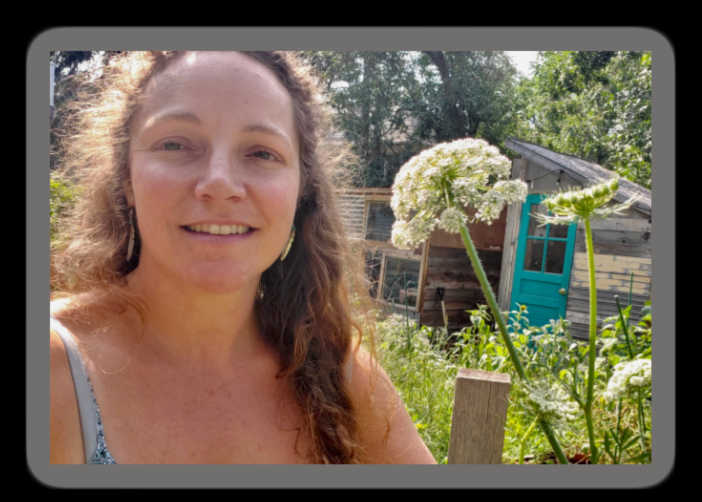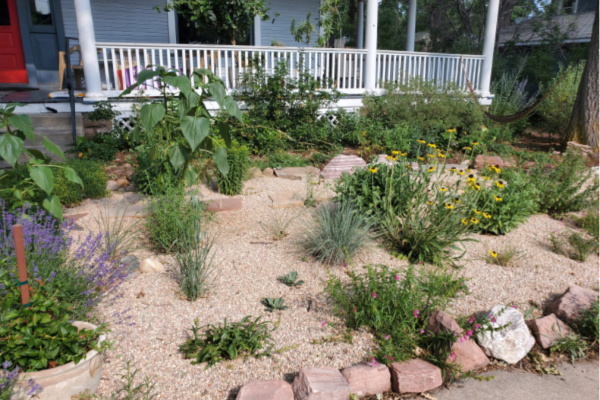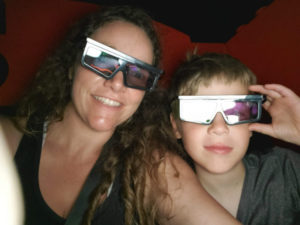Sue: Maggie, I am so excited that the Colorado Native Plant Society now has its first ever Executive Director, but I’m especially excited that it is you! At my first CoNPS conference three years ago you gave a presentation called ‘Botany and Ecocities: Restoring ecosystem services to urban spaces.’ It was focused on planting and growing natives and edibles at home, you had just done a big project in your backyard. I was so impressed with two things: the depth of the knowledge and experience you shared that day, the science; and also the passion – you absolutely infused the audience with your joy and energy. I am certain those qualities will be put to good use for CoNPS!
Sue: I know your undergraduate degree was in Environmental Studies – what led you to choose that subject?
Maggie: Firstly, I am from Berkshire county, MA which is majestic in its own right, but youngsters never appreciate what they have. The very first thought of moving out West came from watching a National Geographic show at my boyfriend’s house in high school. It was about the 10th mountain hut division. From that moment forward, I knew I wanted to learn how to backcountry ski to some hut somewhere. Then I saw a postcard of Jackson Hole, WY, again in high school, and I thought “I need to go there.” So I did. I drove out to Wyoming the summer after high school ended. Got a job as a liftie at Jackson Hole Mountain Resort and the rest is history! You can not live in the mountains and not be curious about environmental studies.
Sue: Can you share with us just a little on why you chose to take this job for CoNPS as the ED?Maggie: Right out of graduate school I took a job as the Program
Manager of the Friends of the Dillon Ranger District in Summit County. This opened my eyes to the world of volunteerism. I had volunteered before but I had never witnessed the phenomenon among adults. It’s an authentic social network. I managed hundreds of volunteers engaged in trail maintenance, ranger patrols and trailhead hosting. Their dedication was impressive, but to them, it was not work. Swinging a pulaski is fun when your friends are doing it with you and you feel a little sense of gratitude and accomplishment when the work is done. Together, we protect the Earth from our own love of it. This is what being a steward means to me. Ever since this first professional experience, I have volunteered with non-profits usually by building science and service programming and then implementing it. Although I have spent the majority of my time paying my bills with my teaching wages, the majority of my effort and concentration goes towards ecological restoration and gardening with native plants projects in my community.
Sue: So have you always been a plant person?
Maggie: I always loved the ‘pretty flowers’ and being outdoors. I started gardening mainly as a way to earn money in college and grad school. I worked then for my professors, and started to get more and more connected to native plants. But my first real native plant mentor was Nancy Redner, and seeing her again at this year’s Annual Conference was just one of the best things about it for me! Her wildflower hikes up on Gore Mountain were my first real leap to the importance of native plants.
Editor’s note: Nancy was a sponsor for our Conference in Trinidad this year, and also was representing the works of Redner Fine Arts in Breckenridge. She was one of the people who started the non-profit Friends of the Dillion Ranger District. Here’s what she had to say about Maggie. “If I had to name a flower that has characteristics of Maggie, it is a buttercup. She has a great way to spread (information) pollen with water on the petals. Maggie is bright yellow, with a can-do attitude and makes it positive.”
Sue: Maggie, your passion for stewardship aligns so perfectly with the mission of the Colorado Native Plant Society, which is to further the knowledge, appreciation, and conservation of native plants and native plant habitats. But one thing we haven’t talked about is your rich background in the science underlying good stewardship of plants and the ecosystems they sustain. You have a B.A in Environmental Studies from Mount Holyoke College, an M.S. in Biology (restoration ecology) from the University of Denver and a PhD in Education (citizen science training) from the University of the Rockies. You’re also a member of the Bard College Citizen Science faculty. You’ve been working on restoration efforts at the Garden of the Gods, and have also created a number of public gardens recently in addition to running a Citizen Science project for CoNPS on the iNaturalist platform. Your scientific credentials are too expansive to list here, I’d like to encourage readers to explore the many diverse aspects of your website Ecocitypartners (https://ecocity.partners/) to get some idea of how much you are bringing to this new job of CoNPS Executive Director.
But before we wind this up, let’s take a little time to meet your family!
Maggie: Well, our Anniversary is September 18th, we counted on our fingers – Aaron and I have been married for 16 years. I have a stepdaughter Mackenzie, who’s 24; and a daughter, Althea,14; and two sons, Graham, 8; and A.J. who’s 5.
Sue: Any pets?
Maggie: Oh yes! We have a German Shepherd pup, the spelling of his name is up for interpretation, but I think it should be Bodhi, which means enlightened. Also a sweet kitty named Olive – they don’t get along at all, so Olive has a kitty door to a basement apartment. We have chickens, Barred Rocks, but the population is declining, we’re down to four. I think a raccoon found a way into their house. Plus many houseplants including a tree in the foyer that was given to Aaron’s parents when he was born! And three citrus trees that spend summers outdoors and are wheeled inside for winter.
Sue: That sounds like a jolly menagerie! Thanks, Maggie, for taking time to introduce yourself to those in our widespread family who may not yet have met you. I know you are planning to get out on the road try to attend as many chapter meetings as possible which will be so beneficial for both the chapters and for the Society. I just know this is going to be a time of exciting developments for the Colorado Native Plant Society! Be sure to check out the next issue of Aquilegia when Maggie will be sharing some specifics of her visions for our future.
Maggie Gaddis, CoNPS Executive Director
Interviewed by: Sue Dingwell,
CoNPS Media Committee




